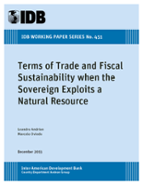Terms of Trade and Fiscal Sustainability when the Sovereign Exploits a Natural Resource
Date
Dec 2013
When it comes to assess the sustainability of fiscal policy and public debt in Andean countries, two idiosyncratic facts of fiscal revenues have to be considered. First, fiscal revenues coming from natural resources represent up to 44% of total fiscal revenues, producing a strong correlation between terms of trade and the overall fiscal balance, ranging from 0.79 in Ecuador to 0.90 in Peru. Second, in most of Andean countries, it is the sovereign who exploits the natural resource by its own and who extends transfers to the private sector according to the results of that exploitation. Under these conditions, terms-of-trade shocks that could threaten the sustainability of a prevailing fiscal policy affect the fiscal balance through both direct and indirect mechanisms. A highly useful tool to discern the final effect of these and other shocks on the sustainability of fiscal policy is a general equilibrium model. This paper offers such a tool which is proven to be an appropriate resource for future evaluations of fiscal policy in Andean countries. Calibrations of the model to Peru and Colombia are used to explore variants of fiscal reactions that these two countries could have employed to withstand the effects of the negative terms-of-trade shock that Latin America experienced in 2009.



